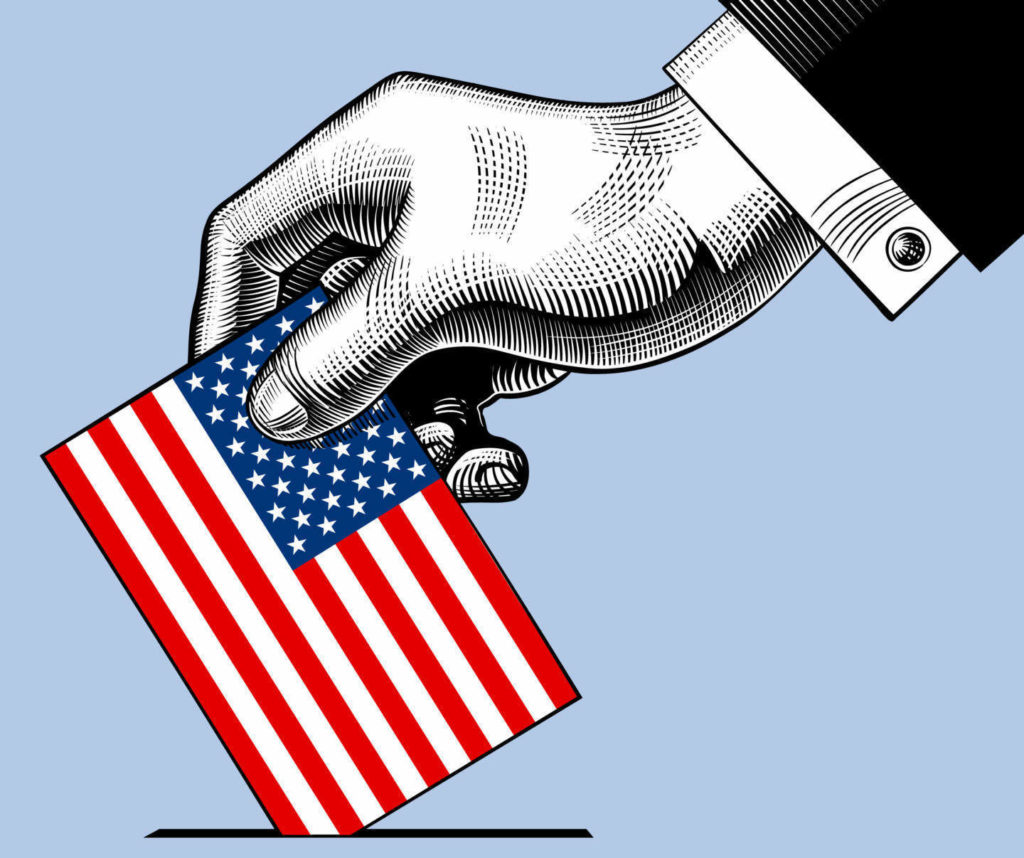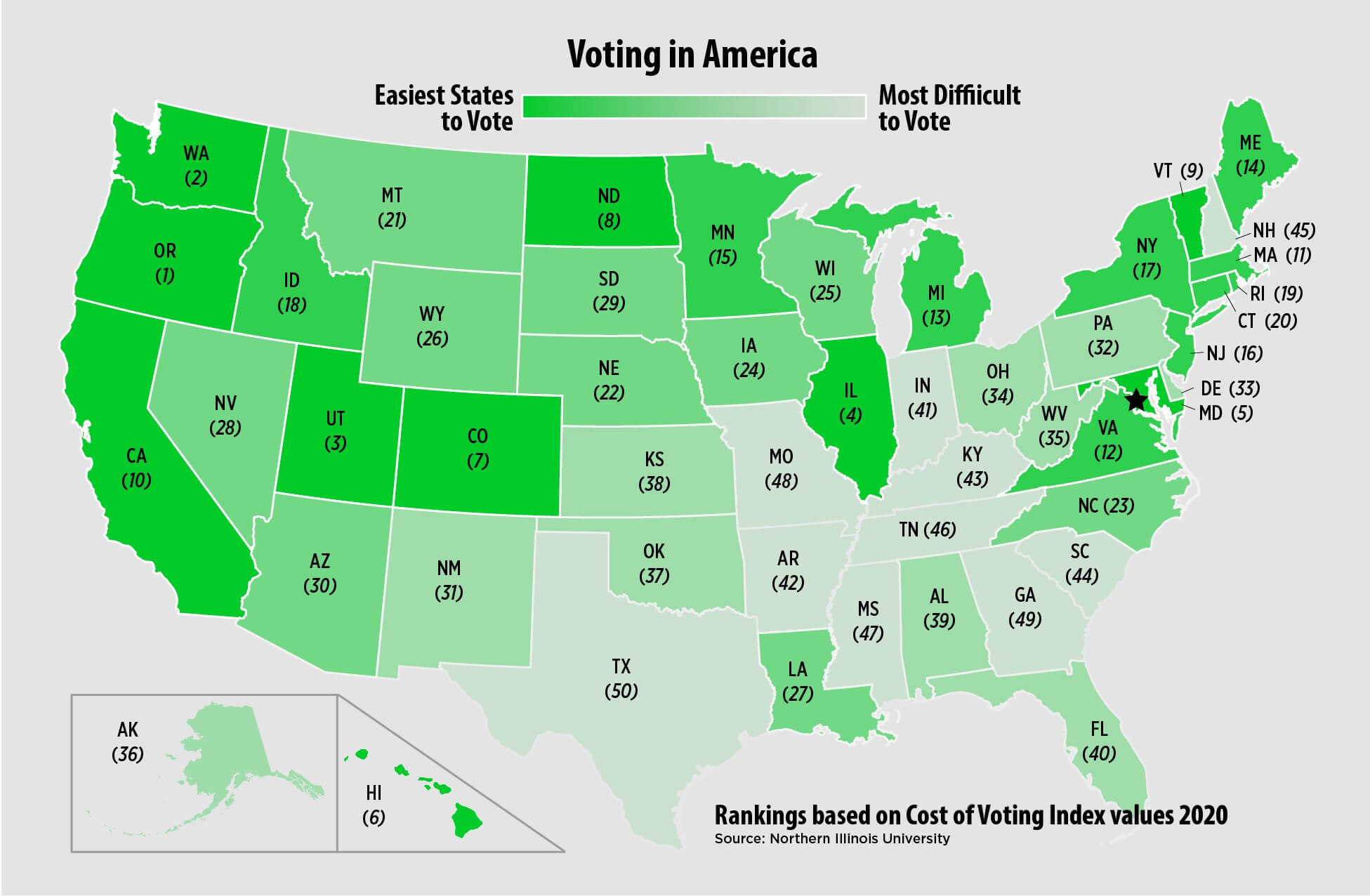Making it Harder to Vote
Lots of places in the US don't make it easy.

Via Northern Illinois University comes this question: How hard is it to vote in your state?
Political scientist Scot Schraufnagel of Northern Illinois University, along with colleagues Michael J. Pomante II of Jacksonville University and Quan Li of Wuhan University in China, recently updated their Cost of Voting Index to reflect a host of new state laws in place for the 2020 election. The analysis is published online ahead of print in Election Law Journal: Rules, Politics, and Policy.
The paper, which updates a previous study, is based on eight variables. These are detailed in the table below.

The results of their tabulation are as follows (Oregon is the least hard, and Texas the most):

In regards to the differences between worst and best (from page 6 of the article):
Texas takes over the 50th spot, representing the state with the most restrictive electoral climate. In particular, Texas has an in-person voter registration deadline 30 days prior to Election Day, has reduced the number of polling stations in some parts of the state by more than 50 percent, and has the most restrictive pre-registration law in the country. States that make voting less costly, like Oregon and Washington, have mail-in voting but also automatic voter registration processes. Other considerations that states with lower COVI values have in common include same day voter registration at the polling station, a significant number of early voting days and laws that make voting more convenient such as paid time off from work to vote.
From the NIU write-up, here’s a map version of the graph:

In regards to Texas, I noted this on Twitter earlier this week:
Two specific noteworthy items just from that tweet that illustrates the issue.
One, since the purpose of the ID is to confirm the person is who they say they area and their registration is proof that they legally can vote, it makes no sense to deny a valid out of state driver’s license, as it performs the identification party ably, even if it does not indicate registration status. Two, a passport likewise does not indicate registration any more than the out-of-state license, but guess who is more likely to have a passport? (Spoiler: the more economically well off).
And, by the way, I suspect that the logic behind accepting the passport and not the license is that the passport proves citizenship. But, of course, so does a Real ID-compliant driver’s license, and the law should reflect that fact. And, for the billionth time: I am not opposed to voter ID, I am opposed to the hodgepodge of rules and ID requirements that clearly disadvantage some voters. Voter ID should be universal, free, and easy to obtain (and ought to come to with automatic registration).
The tweet above is just a simple example of unnecessarily making it harder to vote. And I think it is worth stressing harder. Voter suppression does not have to be denying people access to the ballot box. Just making it harder than it reasonably needs to be is a way to lessen the number of people who vote.
For every voter who goes home to get whatever documentation was needed, some number doesn’t come back. And beyond that, some folks simply won’t try if enough barriers are in the way.
This discussion very much boils down to what the motivations are for these laws and what their actual effects are. At a minimum, there has to be a recognition that the stricter the rules, the more those rules favor the educated and the economically better off (which often has partisan effects).
If we value democracy, we should be willing to invest in the policies and processes of voting. Voting should be easy. And that shouldn’t be a controversial statement.
And yes: the implication is that those who systematically try to make voting harder do not value democracy as much as they value putting rules in place that keep their preferred party and policies in place.
Look back at the map and it is no coincidence that the cluster of states with the lowest rankings are in the south, where rules about voting have historically been directly influenced by racial politics (and simply long-term legacies of slavery and the Civil War).





I keep seeing things like this that remind me that, to my mind, Shelby County v. Holder was the worst decision that Chief Justice Roberts has been party to.
I mean, how does he feel about it now? After multiple court findings of discrimination on the part of the NC legislature? After graphs and charts like this, and narratives like this? Is there some sense of “The extensive pattern of discrimination that led the Court to previously uphold [preclearance, etc] no longer exists” (His words in his concurrence, in which he said he would go further, strike down more of the VRA).
Remember this was in reference to a law that was passed with very strong majorities, and bipartisan support.
The logic therein has an obvious loophole: the pattern didn’t exist – they didn’t discriminate -because the existing preclearance structure wouldn’t allow it. Now, it’s back to the old tricks, maybe just a bit more subtle.
Yes, Republicans don’t believe in democracy.
And White.
However, well-off correlates strongly with educated, and that may start biting GOPs in the ass.
@Jay L Gischer:
Roberts feels just fine about it. There’s no reason to think he didn’t anticipate the consequences of his Shelby County decision. I suspect, that amongst friends and guaranteed privacy, Roberts could deliver a very learned and legalistic version of “we’re a republic, not a democracy.”
At this point, it’s no longer honestly deniable that the GOP/Federalist Society/Rad Trads are seeking to rig the vote.
“Pack the Court, Save the Vote”
https://www.theatlantic.com/ideas/archive/2020/10/dont-let-supreme-court-choose-its-own-electorate/616808/
It’s amazing how other countries manage their election process without all of our psycho-drama. Maybe the time has come to find out what others do and try that instead.
Well… of course. But how many people who cite their lame-o objections are really attempting to do honest discourse in the first place. Most are simply reciting boilerplate stuff they “heard somewhere” most likely. The others don’t want to get caught saying [CLANNNNGGG] shouldn’t be voting in the first place. (60 or so years after William F. Buckley blew his first dog whistle on this point, I might add.)
Progress? Meh…
And now you know why I take my immigrant, naturalized citizen Hispanic wife to our very rural Missouri polling station every election. No poll worker has ever been anything but kind and helpful to her, but I always walk in with a tight jaw and set shoulders just waiting for some redneck “Speak ENGLISH! This is AMURICA, Goldurnit!” with a confederate flag hat and a Proud Boys t-shirt to take exception to her accent or name.
It hasn’t happened, yet, but I know it will.
No surprise. The Republican hierarchy has always been taxpayer > bigot > gunowner > Christian > voter. Voting upsets everything higher than it in the chain of being, so it has to be watched and controlled more carefully than anything else.
Steven wrote:
100% times this!
The recent Circuit Decision about voting rules in Texas was refreshing honest about this fig leaf they are putting on said restrictions:
Aside, imagine if they cared half as much about executing wrongfully convicted individuals as they do about the all but non-existant threat of voter fraud. But then again, it’s that threat of voter fraud that enables them to keep killing whomever they want to (or can get a conviction on).
Or rather: “And yes: the implication is that those who systematically try to make voting harder do not value democracy as much as they value putting rules in place that keep their racial and social inferiors in their place.
It’s not more complicated than Us vs Them. If We Those People don’t want what we say they should have, then they shouldn’t have a say in it.
This is from Corey Robin in the NYRB:
Over the last several years, liberals and Democrats have characterized the power (and the threat) of the GOP in a particular way: Trump and the Republicans are seen as lawless enemies of the Constitution who rely on a combination of rabid rhetoric and mobilized masses to wreak havoc upon established institutions. It’s true that Trump’s tweets are toxic; the thrum of his rallies is ominous; the violence and possibility of more violence are unnerving. But that’s not, in the main, where Trump’s power, or the Republican Party’s, lies. The unsettling fact of the current regime is that it depends, ultimately, not upon these bogeymen of democracy—not on demagoguery, populism, or the masses—but upon the constitutional mainstays we learned about in high-school civics. The most potent source of the GOP’s power is neither fascism nor authoritarianism; it is gonzo constitutionalism.
There’s a second irony. If the Democrats win the White House and the Senate in November, and if they hope to implement the merest plank of their platform, it will be they, and not the Republicans, who will have to engage in a major project of norm erosion. It will be they who will have to abolish the filibuster. It will be they who will have to pack the Supreme Court or limit the courts’ jurisdiction. It will be they, after the longest period of stability in American history in terms of the number of states in the union and seats in the Senate, who will have to admit more states in order to increase the number of Democratic senators.
Should the Democrats take any of these measures—whether to secure the voting rights of African Americans, reduce economic inequality, or address climate change—we will see that norm erosion is not how democracies die but how they are born.
Unsurprisingly, the three easiest states and six of the top ten are from the West. All of those six mailed ballots to all registered voters this year. All six were early adopters of online registration (primarily as a cost-saving measure in the face of high rates of population growth). Several East Coast friends are always surprised when I reiterate what I view as a common western attitude among both liberals and conservatives: I know I have to deal with the local government, but by God it should be easy.
@Michael Cain:
Here in the “benighted” “anarchic” PR of Oregon. Got our ballots in the mail about a week after the ballot book came to our door. SWMBO’d and I had a chance to compare the issues in the book with the commercials running 24/7. Got the ballot, completed, and rather than use a stamp, drove down to the local library (about 1/2 away) and dropped it in the secure ballot drop. Downloaded an app provided by the state, confirmed our ballots were received and counted. While I miss the (childhood) pageantry of standing in line at the local school to go to the booth and vote, my God, this is, even my GOP friends (all 3 of them) agree, WAY TOO EASY AND SECURE!
@gVOR08: You are, of course, entitled to your opinion, even as I have mine. But I dissent from this particular bit of mindreading.
I understand Chief Roberts to have judicial interpretive lines he won’t cross on behalf of partisanship. Scalia had them in the instance habeas corpus but not much else. I’m not sure either Alito or Kavanaugh has any at all.
So I attribute Robert’s concurrence to a sort of naivete that is quite common among white people – a naivete that says “Well, I’m not racist, so surely nobody else, or at least nobody else that matters, is” He was so very wrong about that, as we’ve seen in the Trump years.
Hence I wonder what he thinks now.
Of course, if someone has something concrete to offer as to his thinking on this, I’d be glad to change my opinion.
@mattbernius: Sometimes you crack me up–and I mean that as a compliment. Imagining the party of “it’s better for a thousand innocent men to be
executedincarcerated than for one guilty man to go free” being concerned about wrongful convictions. Great sense of irony.@flat earth luddite: I remember on election day having our teachers up through the 3rd grade reminding us that we had to be extra careful about our conduct on election day “because there are visitors in the building.”
In grades 4-6 the reminders were seemingly not as important. Some assume that it was because we were more mature, but I’ve come to believe that it was because 4th and 5th grade classes were out in portable classrooms and the 6th grade was on the second floor of the building so our “visitors” were less likely to notice us.
@gVOR08:
Perhaps (very) mean-spirited of me, but I also suspect Roberts of, deep down and as a guy who has never studied/worked outside the northeast urban corridor, thinking “I don’t live in any of those states, I’m never going to live in any of those states, and I don’t believe any of my children will ever live in any of those states. Too bad for the people who live there.”
Serendipitously, this evening Scott Lemieux at LGM quotes a piece by Adam Serwer pointing out the insubstantial legal underpinning for Roberts’ Shelby County decision. Also note that saying “the country has changed” is a finding of fact. Appeals courts aren’t supposed to do that.